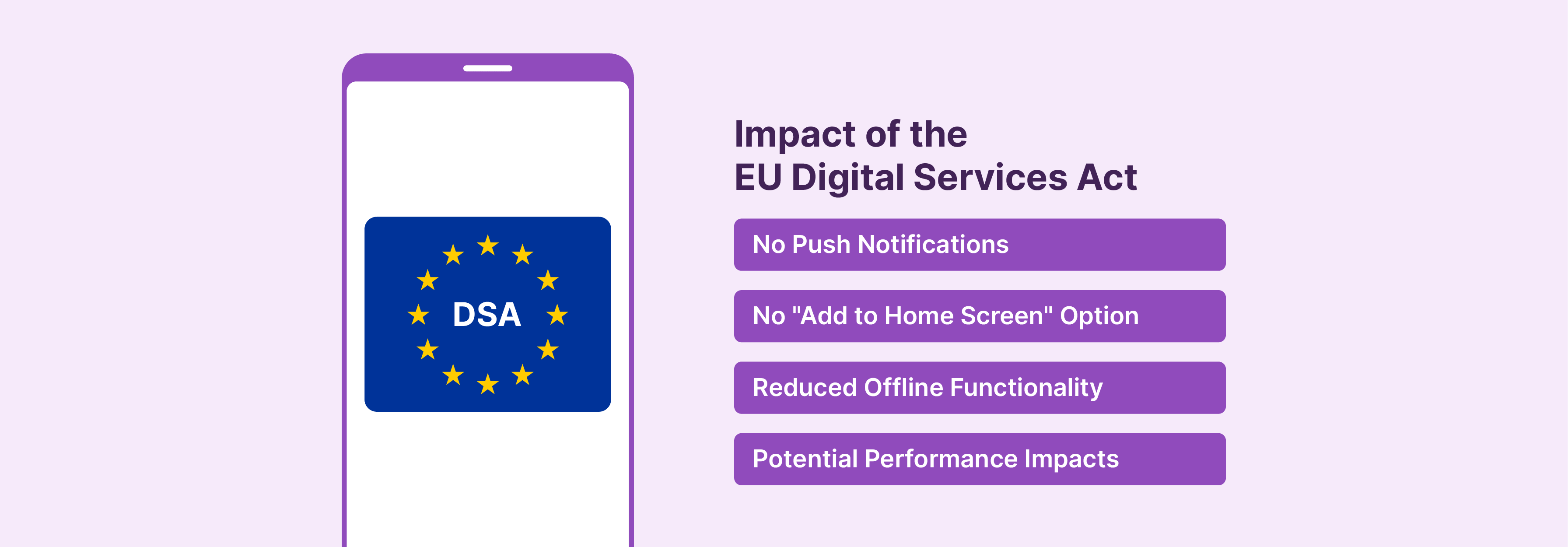
Impact of EU DSA and iOS 17.4 on Magento PWA
Apple's removal of support for progressive web apps (PWAs) in the EU with the iOS 17.4 update has affected Magento stores and EU merchants. The article looks into this decision on Magento PWAs and the impact on user experience.
What is Magento PWA?

Progressive web apps built on the Magento eCommerce platform provide an app-like experience. It combines website and native app features for seamless UX/UI. PWAs offer fast loading, offline mode, and push notifications.
PWAs also consume minimal memory due to their nature as website shortcuts. It offers faster performance and contribute to improved conversion rates.
Magento PWA Features
-
Easy Installation: Easily added to device home screens for quick access.
-
Offline Mode: Accessible without an internet connection.
-
Push Notifications: Real-time updates for promotions and events.
-
Faster Performance: Quick loading times and smooth shopping interactions.
-
Improved Conversion: Enhances sales through seamless experiences.
-
Responsive Design: Optimized for various devices and interfaces.
-
Enhanced Security: Robust measures for data protection.
-
Scalability: Flexible for growing ecommerce businesses.
Impact of the EU Digital Services Act

The EU Digital Services Act (DSA) mandates Apple to permit alternative browsers and app stores on iOS devices. In response, Apple has removed support for PWAs on iOS in the EU with the iOS 17.4 update.
The regulatory change affects the capabilities of Magento PWAs for merchants in the European Union. The removal of PWA support means that EU merchants can no longer offer PWA features that enhance user engagement.
These limitations include:
-
No Push Notifications: Merchants are unable to send real-time notifications to users.
-
No "Add to Home Screen" Option: Users cannot add the PWA to their home screen.
-
Reduced Offline Functionality: The absence of PWA support diminishes the offline functionality of Magento PWAs.
-
Potential Performance Impacts: The performance of Magento PWAs in the EU may be compromised.
Apple's confirmation that iOS no longer supports PWAs in the EU directly responds to the EU's Digital Markets Act (DMA). The regulation requires Apple to open its core platforms to third parties, posing security and privacy concerns.
Apple argues that accommodating alternative browser engines would require architectural changes. It would be impractical given other DMA demands and low PWA adoption.
Apple's Reasoning and Response
Apple explains its decision to remove support for PWAs in the EU in response to the Digital Markets Act (DMA). Apple argues that alternative browser engines would require significant architectural changes. It would be impractical given other DMA demands and low PWA adoption.
Here's a breakdown:
-
Security Concerns: Addressing security risks associated with alternative browser engines necessitates extensive engineering efforts.
-
DMA Compliance: Compliance with the DMA requires Apple to allow alternative browser engines that are incompatible with the current iOS architecture.
-
Low Adoption Impact: The low adoption of Home Screen web apps also influenced the decision.
-
Anti-Competitive: Some view Apple's move as anti-competitive, possibly in response to the DMA requirements.
Apple's response includes:
-
User Impact: Users in the EU can still access websites through bookmarks but lose PWA features.
-
Meeting DMA Compliance: Apple is preparing to meet DMA compliance. It includes allowing sideloading and implementing browser choice prompts.
-
Security Requirements: Developers using alternative browser engines must meet stringent security standards.
-
Engineering Efforts: Apple has invested heavily in DMA-related engineering work, introducing over 600 new APIs and developer tools.
Developer Reaction
Apple's decision to remove support for Progressive Web Apps (PWAs) in the EU has elicited reactions from developers. Many have highlighted concerns within the developer community.
-
Limiting PWA Capabilities: Developers express frustration over the limitations imposed by Apple's move, which restricts the capabilities of PWAs in the EU market.
-
Impact on User Experience: The removal of PWA support undermines developers' ability to provide app-like web experiences for users. It affects web-based applications' overall usability and functionality.
-
Broken Services: Some developers report that essential services like notifications are entirely broken following the removal of PWA support.
Initially, the issue was flagged by security researcher Tommy Mysk and Open Web Advocacy. They observed the demotion of PWAs to website shortcuts in iOS 17.4 beta releases. It raised concerns about whether the change was intentional or resulted from technical issues.
In response, Apple updated its website to explain that compliance with the Digital Markets Act (DMA) necessitated the removal of PWA support. According to Apple, allowing alternative browser engines without robust security measures pose risks to user privacy.
While Apple acknowledges the impact of its decision on developers, critics argue that it reflects the company's desire to control the iOS ecosystem. Others suggest Apple's stance is necessary to uphold user safety.
Developers remain concerned about the broader implications for web-based applications in the EU market. Apple's initial silence on the matter further adds to the uncertainty surrounding the future of PWAs in the iOS ecosystem. Apple’s full explanation is published on Apple’s developer website.
Summary
Apple's removal of progressive web app (PWA) support in the EU with the iOS 17.4 update hampers the full potential of Magento stores. It limits app-like features like push notifications, a recently launched iOS feature. Additionally, PWA data is wiped as the app redirects users to the web browser. The change will impact the performance gains for EU merchants.
Please refer to the MGT Commerce blog to stay updated on the latest Magento news. For hosting assistance during this transition, check out managed Magento hosting.


